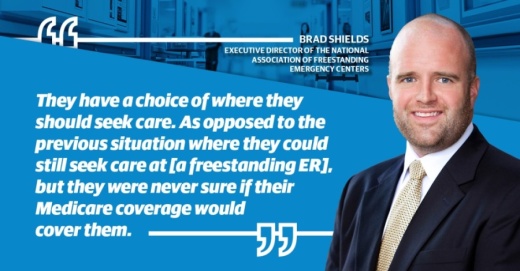In April, the Centers for Medicare & Medicaid Services announced that independent, freestanding ERs in Texas and several other states can be recognized health care providers eligible for reimbursement for treating Medicaid and Medicare patients during the coronavirus pandemic.
The change is a victory for these patients, said Brad Shields, executive director of the National Association of Freestanding Emergency Centers. He added that freestanding ERs across the state have seen a “substantial increase” of Medicare and Medicaid patients since the announcement.
“They have a choice of where they should seek care,” Shields said, "as opposed to the previous situation, where they could still seek care at [a freestanding ER], but they were never sure if their Medicare coverage would cover them.”
Elite Care 24 Hour Emergency Room in Plano has always seen Medicaid and Medicare patients regardless of ability to pay, ER Administrator Richard Burton said. But he said Elite Care is now expecting an increase in patients as a result of the change.
“There is a possibility it could affect our staffing a bit,” Burton said, "which might mean we have to bring out one more person.”
Burton said more patients will be able to take advantage of Elite Care’s quicker appointment turnaround and lower patient volume, as compared to area hospitals. The Plano emergency room sees around 3,000 patients every year, he said.
“We have the same capabilities that a regular hospital emergency room has,” Burton said. “And the main difference coming here is one thing: We’re in the community.”
Many freestanding ERs in Texas have been advocating for this change to be made by U.S. Congress, Shields said.
“As [this is] a new, fairly young, innovative industry, the federal statutes haven’t kept up with the current health care landscape in Texas,” Shields said.
Shields said the state immediately began the enrollment process following the April 21 guidance from CMS.
“We’re working with the state health department. We’re working with the CMS regional offices,” he said. “We’re still going through the rest of the process. The reality is we’re still waiting for our Medicare billing numbers to be issued to us for being able to submit claims to Medicare.”
NAFEC will continue working with CMS to make freestanding ERs a permanent option for Medicaid and Medicare patients, Shields said. The association will also work with the U.S. House of Representatives and the Senate for a federal statutory fix to update the Social Security Act.
“It’s important now during the pandemic, but it’s also going to be important long-term when we’re not in a public health emergency,” he said.
Burton said Elite Care has applied for the Medicare and Medicaid licensing and hopes CMS’s change can continue beyond the pandemic.
“All freestanding ERs should be able to serve their community," he said.





